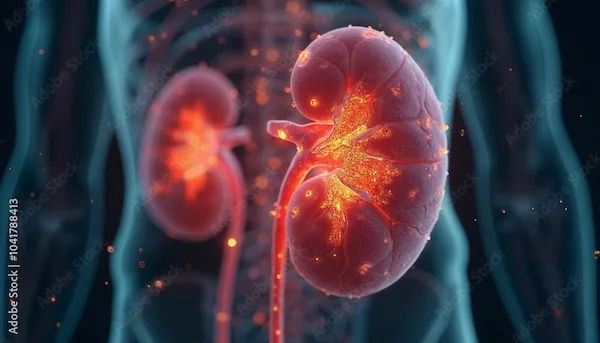Vitamin K: Functions and Benefits Explained
Vitamin K plays a key role in blood clotting, bone strength, and heart health. Learn about its types, benefits, deficiency symptoms, and how to boost your intake naturally.

Written by Dr. D Bhanu Prakash
Reviewed by Dr. Rohinipriyanka Pondugula MBBS
Last updated on 4th Aug, 2025

Introduction
Vitamins are essential for our health, and Vitamin K is one of the most important yet often overlooked nutrients. It plays a crucial role in blood clotting, bone health, and even heart health. If you've ever wondered why Vitamin K is important or how to ensure you're getting enough of it, this article will explain everything in simple terms.
What is Vitamin K?
Vitamin K is a fat-soluble vitamin, which means it dissolves in fats and oils and is stored in the body’s fatty tissues. There are two main types:
1. Vitamin K1 (Phylloquinone) – Found in green leafy vegetables like spinach, kale, and broccoli.
2. Vitamin K2 (Menaquinone) – Found in fermented foods, dairy products, and meats. It is also produced by gut bacteria.
Both forms are important, but they have slightly different roles in the body.
Why is Vitamin K Important?
Here's why Vitamin K is important:
1. Helps in Blood Clotting
One of the most vital functions of Vitamin K is helping your blood clot properly. Without enough Vitamin K, even a small cut could lead to excessive bleeding. This is why newborns are often given a Vitamin K shot shortly after birth—their bodies don’t yet produce enough of it.
2. Supports Bone Health
Vitamin K helps regulate calcium in the body, ensuring it gets deposited in bones rather than in arteries. This makes bones stronger and reduces the risk of fractures and osteoporosis, especially in older adults.
3. Promotes Heart Health
By preventing calcium buildup in blood vessels, Vitamin K2 helps keep arteries flexible and reduces the risk of heart disease.
4. May Improve Brain Function
Some studies suggest that Vitamin K plays a role in brain health, potentially protecting against age-related cognitive decline.
Signs of Vitamin K Deficiency
While Vitamin K deficiency is rare in healthy adults, certain conditions or medications (like blood thinners) can lead to low levels. Symptoms may include:
Easy bruising
Excessive bleeding from cuts or gums
Heavy menstrual periods
Blood in urine or stool
Weak bones (increased risk of fractures)
Who is at Risk?
Newborns (who haven’t yet developed gut bacteria to produce Vitamin K)
People with digestive disorders (like Crohn’s disease or celiac disease)
Those on long-term antibiotics (which kill gut bacteria that produce Vitamin K)
Individuals taking blood thinners (like warfarin)
How to Get Enough Vitamin K?
The best way to ensure adequate Vitamin K intake is through a balanced diet. Here are some great sources:
Foods Rich in Vitamin K1:
Leafy greens: Spinach, kale, collard greens, Swiss chard
Cruciferous vegetables: Broccoli, Brussels sprouts, cabbage
Herbs: Parsley, basil
Consult Top Specialists for Personalised Tips
Foods Rich in Vitamin K2:
Fermented foods: Natto (fermented soybeans), sauerkraut
Animal products: Egg yolks, liver, chicken, beef
Dairy: Cheese, butter
Do You Need Supplements?
Most people get enough Vitamin K from their diet. However, if you have a deficiency or a medical condition affecting absorption, your doctor may recommend supplements. Always consult a healthcare provider before starting any supplements, especially if you take blood thinners.
Lifestyle Tips for Better Vitamin K Absorption
Since Vitamin K is fat-soluble, eating it with healthy fats (like olive oil, nuts, or avocados) helps your body absorb it better. Also:
Maintain gut health – A healthy gut microbiome helps produce Vitamin K2. Eating probiotics (yogurt, kefir) can support this.
Balance medications – If you’re on blood thinners, work with your doctor to monitor Vitamin K intake for stable blood clotting.
When to See a Doctor?
If you experience unusual bleeding, frequent bruising, or bone weakness, consult a doctor. A simple blood test can check your Vitamin K levels.
Need a Consultation? If you have concerns about Vitamin K deficiency or want personalized advice, you can book a consultation with a nutritionist or doctor through Apollo 24|7.
Conclusion
Vitamin K may not get as much attention as other vitamins, but it’s essential for blood clotting, strong bones, and heart health. Eating a diet rich in leafy greens, fermented foods, and healthy fats can help you maintain optimal levels. If you suspect a deficiency, don’t hesitate to seek medical advice.
Consult Top Specialists
Consult Top Specialists for Personalised Tips

Dr. Mohamed Azeem
General Physician/ Internal Medicine Specialist
2 Years • MBBS,MD(Internal Medicine) CCEBDM
Karaikudi
Apollo Hospitals Karaikudi, Karaikudi

Dr. Sandhya Chandel
General Physician/ Internal Medicine Specialist
16 Years • MBBS, MD (Int. Med.), IDCCM
Bilaspur
Apollo Hospitals Seepat Road, Bilaspur
(125+ Patients)

Dr. Harshendra Jaiswal
General Physician/ Internal Medicine Specialist
12 Years • MBBS , MD (General medicine)
Kolkata
108 DHANA DHANVANTARI Clinic, Kolkata
(25+ Patients)

Dr Syed Mateen Pasha
General Physician
2 Years • MBBS
Bengaluru
PRESTIGE SHANTHINIKETAN - SOCIETY CLINIC, Bengaluru

Dr. Anand Ravi
General Physician
2 Years • MBBS
Bengaluru
PRESTIGE SHANTHINIKETAN - SOCIETY CLINIC, Bengaluru
Consult Top Specialists

Dr. Mohamed Azeem
General Physician/ Internal Medicine Specialist
2 Years • MBBS,MD(Internal Medicine) CCEBDM
Karaikudi
Apollo Hospitals Karaikudi, Karaikudi

Dr. Sandhya Chandel
General Physician/ Internal Medicine Specialist
16 Years • MBBS, MD (Int. Med.), IDCCM
Bilaspur
Apollo Hospitals Seepat Road, Bilaspur
(125+ Patients)

Dr. Harshendra Jaiswal
General Physician/ Internal Medicine Specialist
12 Years • MBBS , MD (General medicine)
Kolkata
108 DHANA DHANVANTARI Clinic, Kolkata
(25+ Patients)

Dr Syed Mateen Pasha
General Physician
2 Years • MBBS
Bengaluru
PRESTIGE SHANTHINIKETAN - SOCIETY CLINIC, Bengaluru

Dr. Anand Ravi
General Physician
2 Years • MBBS
Bengaluru
PRESTIGE SHANTHINIKETAN - SOCIETY CLINIC, Bengaluru




